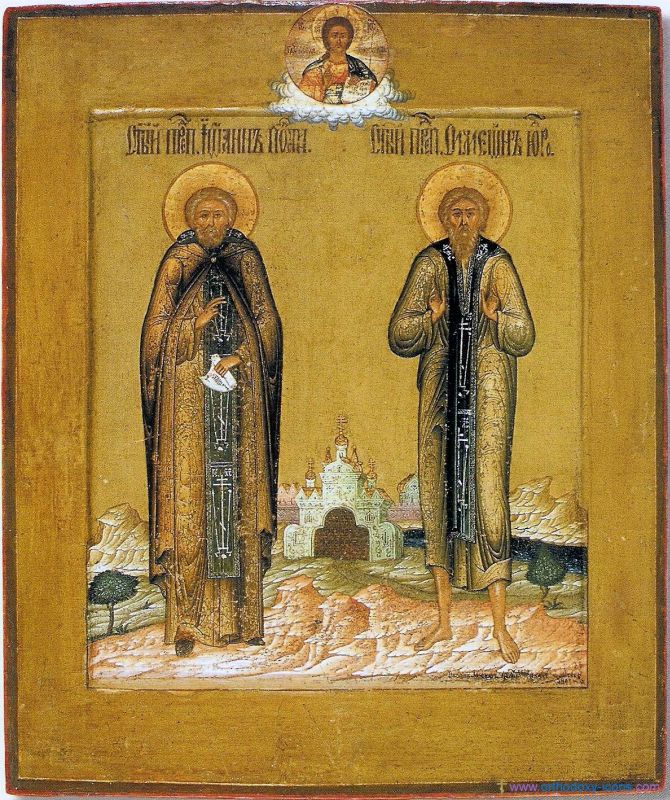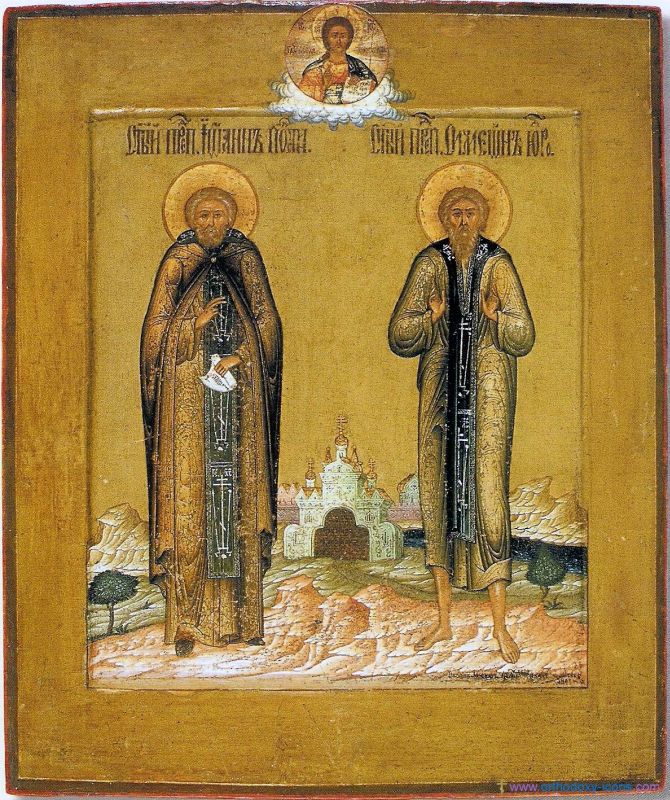
The Monks Simeon, Fool-for-Christ, and his Fellow-Ascetic John were Syrians, and they lived in the sixth century at the city of Edessa. From childhood they were bound by close ties of friendship. The older of them, Simeon, was unmarried and lived with his aged mother. John, however, although he was married, lived with his father (his mother was dead) and with his young wife. Both friends belonged to wealthy families. When Simeon was thirty years old, and John twenty-four, they made a pilgrimage to Jerusalem on the Feast of the Exaltation of the Venerable and Life-Creating Cross of the Lord. On the journey home the friends spoke of the soul's path to salvation. Dismounting their horses, they sent the servants on ahead with the horses, while they continued on foot.
Passing through Jordan, they saw monasteries on the edge of the desert. Both of them were filled with an irrepressible desire to leave the world and spend their remaining life in monastic struggles. They turned off from the road, which their servants followed to Syria, and they prayed zealously that God would guide them to the monasteries on the opposite side. They besought the Lord to indicate which monastery they should choose, and they decided to enter whichever monastery had its gates open. At this time the Lord informed Igumen Nikon in a dream to open the monastery gates, so that the sheep of Christ could enter in.
In great joy the comrades came through the open gates of the monastery, where they were warmly welcomed by the igumen, and they remained at the monastery. In a short while they received the monastic tonsure.
After remaining at the monastery for a certain time, Simeon desired to intensify his efforts, and to go into the desert to pursue asceticism in complete solitude. John did not wish to be left behind by his companion, and he decided to share with him the work of a desert-dweller. The Lord revealed the intentions of the companions to Igumen Nikon, and on that night when Sts Simeon and John intended to depart the monastery, he himself opened the gates for them. He prayed with them, gave them his blessing and sent them into the wilderness.
When they began their life in the desert, the spiritual brothers at first experienced the strong assaults of the devil. They were tempted by grief over abandoning their families, and the demons tried to discourage the ascetics, subjecting them to weakness, despondency and idleness. The brothers Simeon and John remembered their monastic calling, and trusting in the prayers of their Elder Nikon, they continued upon their chosen path. They spent their time in unceasing prayer and strict fasting, encouraging one another in their struggle against temptation.
After a while, with God's help, the temptations stopped. The monks were told by God that Simeon's mother and John's wife had died, and that the Lord had vouchsafed them the blessings of Paradise. After this Simeon and John lived in the desert for twenty-nine years, and they attained complete dispassion (apathia) and a high degree of spirituality. St Simeon, through the inspiration of God, considered that now it was proper for him to serve people. To do this, he must leave the desert solitude and go into the world. St John, however, believing that he had not attained such a degree of dispassion as his companion, decided not to leave the wilderness.
The brethren parted with tears. Simeon journeyed to Jerusalem, and there he venerated the Tomb of the Lord and all the holy places. By his great humility the holy ascetic entreated the Lord to permit him to serve his neighbor in such a way that they should not acknowledge him. St Simeon chose for himself the difficult task of foolishness for Christ. Having come to the city of Emesa, he stayed there and passed himself off as a simpleton, behaving strangely, for which he was subjected to insults, abuse and beatings. In spite of this, he accomplished many good deeds. He cast out demons, healed the sick, delivered people from immanent death, brought the unbelieving to faith, and sinners to repentance.
All these things he did under the guise of foolishness, and he never received praise or thanks from people. St John highly esteemed his spiritual brother, however. When one of the inhabitants of the city of Emesa visited him in the wilderness, asking for his advice and prayers, he would invariably direct them to "the fool Simeon", who was better able to offer them spiritual counsel. For three days before his death St Simeon ceased to appear on the streets, and he enclosed himself in his hut, where there was nothing except for bundles of firewood. Having remained in unceasing prayer for three days, St Simeon fell asleep in the Lord. Some of the city poor, his companions, had not seen the fool for some time. They went to his hut and found him dead.
Taking up the dead body, they carried him without church singing to a place where the homeless and strangers were buried. While they carried the body of St Simeon, several of the inhabitants heard a wondrous church singing, but could not understand from whence it came.
After St Simeon died, St John also fell asleep in the Lord. Shortly before his death, St Simeon saw a vision of his spiritual brother wearing a crown upon his head with the inscription: "For endurance in the desert."
Troparion - Tone 1
Having heard the voice of Your Apostle Paul:
We are fools for Christ's sake!
Your servant Simeon, O Christ God,
Lived the life of a fool here on earth for Your sake.
Therefore as we venerate his memory,
We entreat You, O Lord, to save our souls!
Kontakion - Tone 2
Let us praise with fervent love,
This man who lived in the flesh as an angel,
Adorning his soul with the most radiant virtues!
Simeon, the equal to the Apostles and the Bearer of God.
Together with him, let us honor his companion John,
For they both ever stand before God, interceding for us all!
 The Monks Simeon, Fool-for-Christ, and his Fellow-Ascetic John were Syrians, and they lived in the sixth century at the city of Edessa. From childhood they were bound by close ties of friendship. The older of them, Simeon, was unmarried and lived with his aged mother. John, however, although he was married, lived with his father (his mother was dead) and with his young wife. Both friends belonged to wealthy families. When Simeon was thirty years old, and John twenty-four, they made a pilgrimage to Jerusalem on the Feast of the Exaltation of the Venerable and Life-Creating Cross of the Lord. On the journey home the friends spoke of the soul's path to salvation. Dismounting their horses, they sent the servants on ahead with the horses, while they continued on foot.
The Monks Simeon, Fool-for-Christ, and his Fellow-Ascetic John were Syrians, and they lived in the sixth century at the city of Edessa. From childhood they were bound by close ties of friendship. The older of them, Simeon, was unmarried and lived with his aged mother. John, however, although he was married, lived with his father (his mother was dead) and with his young wife. Both friends belonged to wealthy families. When Simeon was thirty years old, and John twenty-four, they made a pilgrimage to Jerusalem on the Feast of the Exaltation of the Venerable and Life-Creating Cross of the Lord. On the journey home the friends spoke of the soul's path to salvation. Dismounting their horses, they sent the servants on ahead with the horses, while they continued on foot.